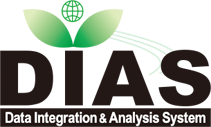


  |  |
| Name | Bombus terrestris and native bumblebee monitoring |
| Metadata Identifier | bumblebee20230727062438-DIAS20221121113753-en |
| Name | Conservation Ecology Laboratory |
|---|---|
| Organization | The University of Tokyo |
| Address | 1-1-1 Yayoi, Bunkyo-ku, Tokyo, 113-8657, Japan |
| TEL | +81-3-5841-8915 |
| FAX | +81-3-5841-8916 |
| busters@cons.es.a.u-tokyo.ac.jp |
| Name | DIAS Office |
|---|---|
| Organization | Japan Agency for Marine-Earth Science and Technology |
| Address | 3173-25, Showa-Cho, Kanazawa-ku, Yokohama-shi, Kanagawa, 236-0001, Japan |
| dias-office@diasjp.net |
| Name | Conservation Ecology Laboratory |
|---|---|
| Organization | The University of Tokyo |
| busters@cons.es.a.u-tokyo.ac.jp |
| Name | Conservation Ecology Laboratory |
|---|---|
| Organization | The University of Tokyo |
| busters@cons.es.a.u-tokyo.ac.jp |
creation : 2007-03-31
revision : 2008-03-31
revision : 2009-03-31
publication : 2008-10-29
This data set is data of captured or monitored Bombus terrestris in Hokkaido, Japan, which was designated as Invasive Alien Species by Invasive Alien Species Act. Data also includes monitoring data of native bumblebee species. Recorded data is date, place, name of species, behavior and caste, etc., and compiled annually. Participatory monitoring system is applied for data collecting. Most of monitors are local residents in Hokkaido.
environment
| Begin Date | 2006-04-01 |
| End Date | 2010-03-31 |
| Temporal Characteristics | Active season of bumblebees. From March to November. |
| North bound latitude | 46 |
| West bound longitude | 140 |
| Eastbound longitude | 146 |
| South bound latitude | 41 |
Hokkaido, Japan
| Keyword Type | Keyword | Keyword thesaurus Name |
|---|---|---|
| theme | Biosphere > Ecological Dynamics > Community Dynamics > Invasive Species | GCMD_science |
| theme | Biological Classification > Animals/Invertebrates > Arthropods > Hexapods > Insects | GCMD_science |
| Keyword Type | Keyword | Keyword thesaurus Name |
|---|---|---|
| theme | DIAS > Data Integration and Analysis System | No_Dictionary |
Data was collected through the participatory monitoring system, and most of monitors are the local residents in Hokkaido. Monitors conduct occasional monitoring during the active season of bumblebees. When they capture/monitor Bombus terrestris, they record the date, weather, temperature, place, behavior (name of flower species in case of flower visiting) and caste. In the case that native bumblebee species is monitored, the name of species should be added to the recorded data. These data are sent to data manager for processing.
Data in 2006 is not released due to being unprocessed.
Whenever this data set is used for presentations and publications, author(s) shall specify the acknowledgement for citizen volunteers who provided the data and who contributed the promotion of this monitoring activity.
If data provider does not have data policy, DIAS Terms of Service (https://diasjp.net/en/terms/) and DIAS Privacy Policy (https://diasjp.net/en/privacy/) apply.
If there is a conflict between DIAS Terms of Service and data provider's policy, the data provider's policy shall prevail.
If you plan to use this dataset for a conference presentation, paper, journal article, or report etc., please include acknowledgments referred to following examples. If the data provider describes examples of acknowledgments, include them as well.
" In this study, [Name of Dataset] provided by [Name of Data Provider] was utilized. This dataset was also collected and provided under the Data Integration and Analysis System (DIAS), which was developed and operated by a project supported by the Ministry of Education, Culture, Sports, Science and Technology. "